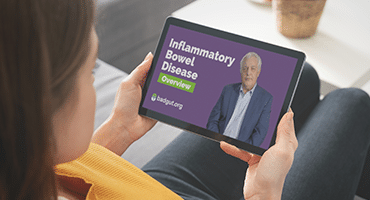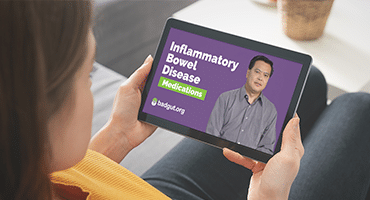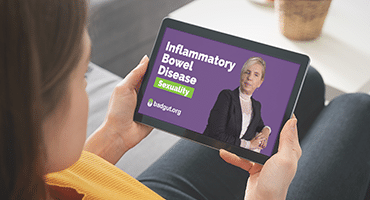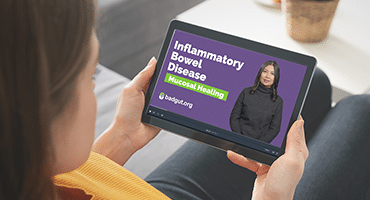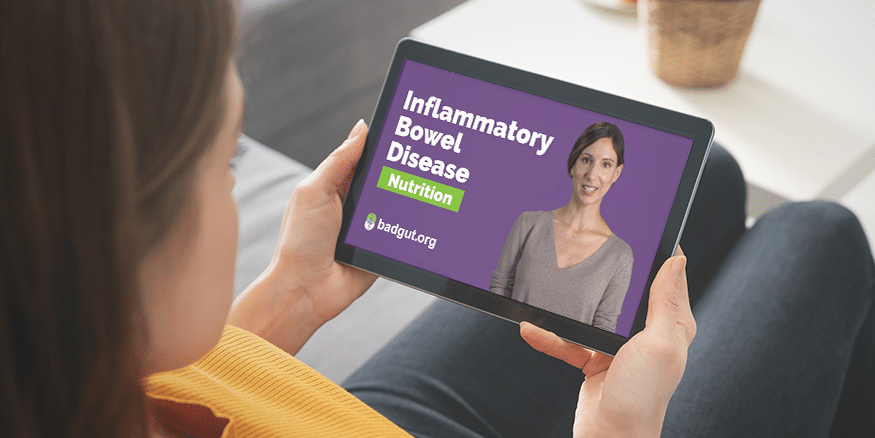
Nutrition for IBD (Crohn’s and Colitis) Video
Featuring
Anne-Marie Stelluti
Registered Dietitian
modernguthealth.com
Video Transcript
If you have inflammatory bowel disease, also known as IBD, and you want to know more about how to eat to help support the management of your disease, then this is the video for you.
Since IBD affects the gut, finding the right diet can take some work. IBD can cause you to lose your appetite, lose too much weight, eat less food to avoid symptoms, and experience nutritional deficiencies.
During a flare, these factors are often more prevalent.
Long-term health consequences of malnutrition in IBD vary between Crohn’s disease and ulcerative colitis, and can include anemia and bone disease, such as osteoporosis. The goal is to prevent this from happening.
Dietary management of IBD typically focuses on optimizing nutritional status, preventing malnutrition, and symptom management, which may include avoiding certain foods that can make symptoms worse.
There is no one diet for everyone with IBD, but rather an individualized diet, since each person can have different symptoms, diet tolerances, medications, disease locations, and lifestyles.
When you are in remission, which is when your disease and symptoms are well-managed through medications and/or other treatments, it is easier to eat well.
It is best to focus on eating a healthy, varied, and well-balanced diet so that you do not need to take many supplements. Typically, you can get enough micronutrients through food, aside from vitamin D, for which you will likely still need a supplement.
As for what to eat, the International Organization for the Study of IBD advises that those with IBD eat a balanced diet and limit their intake of processed foods, artificial sweeteners, and trans fats. The new Canada’s Food Guide has information on eating a general balanced diet.
You don’t need to restrict any specific food group while you are in remission.
However, some people do associate certain types and quantities of food, such as lots of raw lettuce, with increased symptoms. If this applies to you, you can avoid these foods, but speak with a dietitian to make sure you aren’t missing out on too many nutrients if you are eliminating many foods from your diet.
While eating lots of fibre might be painful and cause more symptoms when your gut is inflamed, try to increase your fibre intake when you are feeling well, because fibre can play an important role in maintaining remission.
Some evidence shows that fibre has a beneficial effect on commensal gut bacteria and results in the production of short chain fatty acids, which have been shown to stimulate water and sodium absorption in the colon and promote mucosal healing.
However, if you have chronic stricturing disease, such as luminal narrowing or partial bowel obstruction, it will likely be best to stick with a longer-term low fibre diet, even in remission, to prevent further obstruction and gut symptoms.
Foods rich in prebiotics, which are fibres that feed the good bacteria in the gut, can help reduce inflammation and restore the mucosal barrier function. Some examples of foods with prebiotics include bananas, oatmeal, tomatoes, onions, garlic, and beans.
Since Crohn’s disease and ulcerative colitis are inflammatory diseases, it can be helpful to focus on eating anti-inflammatory foods, especially cruciferous vegetables, citrus foods, green tea, and healthy fats, like those found in nuts, seeds, avocados, and fish.
Eating enough nutritious food during remission, along with exercise, is important to build up your strength and remain well nourished.
When you are experiencing a flare of active disease, you might need to change your diet to help manage symptoms such as nausea, loss of appetite, diarrhea, and intestinal pain.
While no particular food category or single food item can be broadly associated with triggering a disease flare, some foods might be more likely to irritate the gut.
Insoluble fibre can irritate an inflamed gut, so reducing your intake of nuts, seeds, popcorn, and uncooked vegetables, can help reduce symptoms. In addition, since an inflamed gut has more difficulty digesting and absorbing nutrients, it can be helpful to process food in a way that makes it easier to digest.
Blending, grinding, and cooking your food can enhance nutrient absorption, minimize irritants to the gut, and allow for mucosal healing.
You will need to eat more protein during a flare in order to aid in healing. Some types of protein, such as eggs, can be easier to digest than others, such as beans and steak.
While individuals with IBD aren’t at an increased risk of lactose intolerance, it is still very common. So, if you experience bloating, abdominal pain, or diarrhea after eating foods that contain lactose, then restricting dairy might help.
There are many general dietary strategies to help manage gut symptoms during a flare. Eating more soluble fibre, in foods such as bananas, oatmeal, and applesauce, can help reduce diarrhea, as can avoiding sugary drinks, alcohol, and caffeine.
Sipping on homemade oral rehydration solutions can replenish electrolytes lost from diarrhea.
If you have trouble eating enough due to poor appetite, try eating smaller meals, more frequently.
Enteral nutrition, which is liquid nutrition through a tube, is an option for those who are malnourished and have active disease, or for those who are in remission, but can’t get enough calories orally.
L-glutamine is an amino acid that helps repair epithelial cells, maintain mucosal function, enhance immune responsiveness, and inhibit inflammatory responses, so you might find supplementation beneficial.
While omega-3 fats, such as fish oil, are not effective for the maintenance of IBD remission, they are anti-inflammatory fats that can be a nutritious addition to the diet.
A daily multivitamin can help you meet your basic micronutrient needs if you aren’t able to eat many foods.
You might have heard that probiotics are effective at treating IBD, but there isn’t a lot of good evidence at this time. There are a few products that research has shown to be promising for ulcerative colitis, but none so far for Crohn’s disease. In addition, physicians recommend against using probiotics during a Crohn’s disease flare, because it increases your risk for bacteremia, which is the presence of bacteria in the blood.
Speak with your physician before adding any supplements into your routine.
Vitamin and mineral deficiencies are common in those with IBD, for a variety of reasons. These include inflammation, reduced oral intake, blood loss, malabsorption, maldigestion, increased energy expenditure, and protein loss.
The most common deficiencies resulting from IBD are iron, vitamin D, vitamin B12, and zinc. The type of nutrient deficiency you are at risk for depends on which areas of your digestive tract are inflamed.
Active Crohn’s disease in the terminal ileum can cause difficulty absorbing fats and the fat-soluble vitamins, A, D, E, and K, as well as vitamin B12.
Inflammation in the proximal small intestine can interfere with iron and calcium absorption.
In diffuse small bowel disease, zinc deficiency is possible.
Severe colonic disease, such as in ulcerative colitis, can lead to ongoing blood loss and iron deficiency.
Anemia is prevalent in those with IBD since iron deficiency is so common. Food sources of iron are usually not enough to replenish levels, so supplementation is often necessary. Folic acid deficiency is less common than many other deficiencies, but it can contribute to anemia. Individuals who take the medications sulfasalazine or methotrexate might need a folic acid supplement.
Individuals with Crohn’s disease are at risk for developing osteoporosis. Some causes include malnutrition, vitamin D deficiency, glucocorticoid treatment, and active inflammation. Vitamin D is also important in immune system regulation. Most people with IBD should take calcium and vitamin D supplements, with regular monitoring of vitamin D blood levels.
Inflamed tissue in the small intestine can cause zinc malabsorption, which can lead to zinc deficiency. Individuals who have ostomies, fistulas, or more than 8 watery stools per day are also at a greater risk of zinc deficiency. If you are affected by any of these factors, your physician might recommend zinc supplementation.
If you have an inflammatory bowel disease, it is important to eat well when you are feeling well to help build up your strength, increase vitamin and mineral reserves, and gain weight, if necessary. During a flare, you might not be able to eat the way you normally do, but it is a good idea to focus on foods that are nutritious and don’t increase your symptoms. You might also need to take some supplements.















